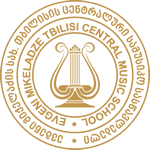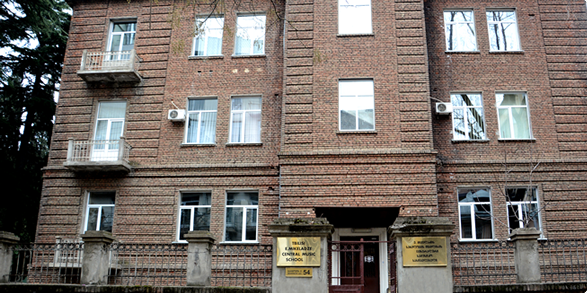Tbilisi Evgeni Mikeladze Central Music School
Tbilisi Evgeni Mikeladze Central Music School is one of the most significant platforms for the secondary professional education. It obtained prominent and strong reputation throughout its long history and rich traditions.
Tbilisi School #9
Evgeni Mikeladze Central Music School was established in 1922 as a music studio, which afterwards was transformed into E. Mikeladze Tbilisi Music Shool #9.
In 1951, director of the school became Ilia Kharabadze (1914-19178), young, active musician, violinist and afterwards honored teacher of Georgia. His distinguished talent transformed the school into one of the leading laboratories of young musicians.
Through his immense efforts, the school obtained separate building at #54 Barnov street, Tbilisi The school has the same address since 1971 (before that it was based under #183 and since 1961 under #53 secondary schools’ buildings). Since 1973 the school bears Evngerni Mikeladze name which was also merit of Ilia Khrabadze who coincided this event with 50- year anniversary of the school and the 70th birthday of famous Georgian Conductor Evgeni Mikeladze. This event was celebrated in the recital hall of the Tbilisi Conservatoire. (See the gallery).
New building and school expansion brought fresh air for the school and created broader possibilities for students’ music education. The school obtained new instruments, new pianos in the schoolrooms. At that time, one of the modern music audio- cabinet was established which was equipped with rich selection of gramophone records and tape- recorders. Such cabinet provided opportunities for teachers to conduct classes using all the necessary illustrative and audio music materials.
The school founded children trio and quartet ensembles, choir, children chamber string, wind orchestras where teacher also were performing jointly with their students. It should be noted that male students from piano department, studding wind instruments as secondary specialties, also performed in the wind orchestra.
Such educational reforms transformed E. Mikeladze Tbilisi Music Shool #9 into one of the leading centers of children music education. It was always among leaders during Tbilisi Schools Inspections. Number of schoolchildren was awarded by the prizes, diplomas and teachers with state prizes from the Ministry of Culture of Georgia.
Number of highly qualified and famous teachers worked in the school. The head of the piano department was Nino Pharkosadze. Such famous teachers led piano classes as Margarita and Larisa Bakhtadze’s, Guliko Gabashvili, Lili Gabunia, Diana Khirseli.
Head of the Orchestra Department was Henrix Shaverdian, tutor of many famous violinists of Georgia. Such well-known teachers were leading violin classes as Shota Shanidze and Irakli Beridze, later professor of the Tbilisi State Conservatoire, Nukri Davitashvili, (chello), Edisher Datebashvili (contrabass), Otar Ramishvili (guitar), David Erikashvili (flute), Guram Chinchaladze and Boris Lazarev (clarinet).
Theory classes were provided by Natela Chikhladze, Medea Khebakhiani while composition was taught by Meri Davitashvili, famous Georgian composer and Misha Shugliashvili, well-known theorist and composer. Most of their students follow music carrier and they work successfully as of today as in this school so in Tbilisi conservatoire, orchestras and other music institutions. Some of them went further in the music carrier and established strong names in the international arena.
In 1978, Ilia Kharabadze passed away and the school director became George Korkadze, young, energetic musician and violinist, which leads the school up to present. During his period, the school broadened its success. The school students had been constantly participating at the young musicians’ festivals locally and in other republics of Soviet Union obtaining leading prizes. (See our laureates).
G. Korkadze continued and expanded Ilia Khrabadze efforts to establish, built and strengthen contacts and friendship relations with other music schools of the region and other republics. Number of exchange concerts in Tbilisi as well as in Moscow Leningrad, Kiev, Odessa, Riga, Yerevan, Baku and Kirovabad took place. Moreover, the students of the school were invited at the scientific conference in town Lodze, Poland, were issues such as music education in the music schools were discussed.
Evgeni Mikeladze College of Music
In 90th, E. Mikeladze Tbilisi Music Shool #9 moved to the new and challenging stage of its operation. The Soviet Union was demolished; cataclysm in Georgia as civil wars, political and social turmoil brought mere survival need and raised an issue of maintaining the rich music cultural tradition. Socio-cultural instability of the country caused vast migration, especially, from the music sphere. These conditions brought dangerous tendency in orchestras to loose professional performers. Major task became creation due platform for attracting gifted young people and support their music professional development.
In order to meet set targets, TbilisiMusicSchool #9 was transformed into Evgeni Mikeladze Music Colledge in 1991, focusing on strengthening orchestra direction and growing orchestra professionals. This integration gave a start to more profound reforms and transformation of the music education process into rather progressive and contemporary teaching methods.
The college introduced two-step education: 1-7 classes for beginners and middle special education upper 1-4 grade. After the graduation of the college, the students were awarded with Diplomas, as well as the qualification and work permits. The school curricula were thoroughly amended and new taught programs worked out based on the international best practices.
The first step (1-7 classes) of the college education where for 7-14 year children. At this level, college introduced exclusively only the first time in Georgia, differential model studies. Based on this model two taught programs: liberal and specialized were provided at the beginning level, taking into consideration students’ skills, gifts and future interests with regard of music profession.
Liberal model was based on “General Music Education” program following ordinary music school plans and taught course. The second was following the “Special Music Education” course, aiming more focused and advanced curricula approved by the Ministry of Culture of Georgia in 1991.
Flexible system of differential education model provided opportunity to select gifted children after the enrollment of exams in the Special Music Education group and others in the General music education group. The selected children had possibility to continue music education as a professional specialty right from the beginning.
Constant selection was carried out afterwards as well and based on the students’ merits and professional skills they were transferred in different learning groups graded by various intensity. This model excluded possibility to have weaker students unable to meet requirements of the academic class; meanwhile, strong students have possibility to be transferred into Special Music Sector. Meanwhile, all other students keep the same option to obtain high quality general music education.
Second level of the school consisted of four grades. It was based on confirmed curricula and its goals were oriented to professional middle special music education. Students who studied successfully in the intensive group (7 grades) were able to continue studies at this level.
Invited high-qualified teachers, hard work and intensive education curricula created strong ground for students’ successes, which was reflected in number of prizes and winning competitions as well as festivals. Some of them became presidents’ grantees and alumnus. The college graduates became well-known musicians who have been continuing their performance in Georgia and abroad.
Asiko (Akvsenti) Megrelidze (1937-2012), head of Orchestra Department, Honored teacher of Georgia and owner of Honored Knight Order, was among those whose immense contribution brought successful operation of Orchestra department.
E. Mikeladze Central Music School
During the reforms of 2006, Tbilisi experimental school under Tbilisi Conservatoire was liquidated and its full contingent joint E. Mikeladze Music College, which was transformed into E. Mikeladze Central Music School. After this merging, 12-year special education model was introduced and vocal, choir-conducting and theoretical-composition departments (from 7th grade) were added.
From 2006, the school set more important goals including implementing responsibilities towards the state and carry out education and performing activities in a highly professional level. The major aim remains to bring up new generation of musicians, constant source of the professional performers.
The prominent success what the school has over years is confirmed by number of winning international competitions and festivals, high number of concerts annually in various cities and concerts halls including small and big halls of the conservatoire, national center of music “Muza” and composers union hall, etc.
Prominent students were identified in the school who attracted attention due to their success among are pianists and laureates of number of international competitions: Mariam Batsashvili, Salome Jhordania, Levan Ugulava under Nata Natsvlishvili, Inali Djioev, Hoboi under teacher I. Djioev, Nata Roinishvili, Vioin, under teacher M. Kantaria, TamarJirjadze, violin under teacher D. Jaiani, Davit Djishjkariani and Davit Darbiani, Clarinets under teacher d. Djishkariani, George Oikashvili under prof, R Japaridze, Vocalists, winners, laureates of international vocalists competitions: Ketevan Tsutskiridze, Khatuna Jalabadze, Teona Dalakishvili, Baia Saganelidze under teacher T. Sarvazishvili, etc.
String orchestra under George Shilakadze continued functioning in the school, which participated in t. Mercia, Spain at the 28nd International Festival of young Orchestrates and became its winner. Wind instrumental orchestra became multi- prized as well under Sergo Tkabladze.
The school has strong contacts with the music school abroad. It has long relationship with t. Potsdam I. S Bach music school having exchange program annually among the schools. Every year, 3-4 successful students visit Germany and participate in scheduled symphonic concerts and visa-versa, German young musicians travel to Georgia and participate in joint music concerts with the Georgian counterparts.
In 2009 the school became a friend of number of music schools in Baku and held joint concerts in Tbilisi and Baku. In 2013 from 5 through 10 june, E. Mikeladze school students have been invited in Baku to the anniversary event to Geidan Aliev memory.
Chamber “Kamerton:, established as international charity project, obtained big success. The chamber held charity concerts in the German cities with the big support of the, Lyudmila fon Berg, project head and German public figure. Some members of the ensemble participate separately at the concerts as the members of the young international orchestras.
Famous international charity foundation “SOS TALENTS” under its founder Michele Soni, pianist collaborates actively with the school. Barbare Tataradze and Ilia Lomtatidze, students of the piano department of the school and foundation scholarship alumnus, constantly participate at the master-classes and concerts organized by Michele Soni in France and Switzerland.
Starting from 2024, the educational institution switched to an 11-year study program, which was dictated by the achievement of structural compatibility with other educational institutions operating in Georgia that implement their academic programs within the framework of 11-year schooling.
The school continues its active performing and education activities, which is the strong ground for future carrier and professional success of young generation of musicians

